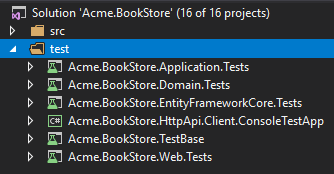ASP.NET Core MVC / Razor Pages Tutorial - Part 3
About this tutorial
This is the third part of the ASP.NET Core MVC / Razor Pages tutorial series. See all parts:
- Part I: Creating the project and book list page
- Part II: Creating, updating and deleting books
- Part III: Integration tests (this tutorial)
The completed sample is available: bookstore-mvc-ef.zip. To be able to download this sample, you need to hold an active ABP Commercial license.
You can also check out the video course prepared by the community, based on this tutorial.
Test projects in the solution
This part covers the server side tests. There are several test projects in the solution:

Each project is used to test the related project. Test projects use the following libraries for testing:
- Xunit as the main test framework.
- Shoudly as the assertion library.
- NSubstitute as the mocking library.
Adding test data
Startup template contains the BookStoreTestDataBuilder class in the Acme.BookStore.TestBase project which creates initial data to run tests. Change the content of BookStoreTestDataSeedContributor class as show below:
using System;
using System.Threading.Tasks;
using Volo.Abp.Data;
using Volo.Abp.DependencyInjection;
using Volo.Abp.Domain.Repositories;
using Volo.Abp.Guids;
namespace Acme.BookStore
{
public class BookStoreTestDataSeedContributor
: IDataSeedContributor, ITransientDependency
{
private readonly IRepository<Book, Guid> _bookRepository;
private readonly IGuidGenerator _guidGenerator;
public BookStoreTestDataSeedContributor(
IRepository<Book, Guid> bookRepository,
IGuidGenerator guidGenerator)
{
_bookRepository = bookRepository;
_guidGenerator = guidGenerator;
}
public async Task SeedAsync(DataSeedContext context)
{
await _bookRepository.InsertAsync(
new Book(id: _guidGenerator.Create(),
name: "Test book 1",
type: BookType.Fantastic,
publishDate: new DateTime(2015, 05, 24),
price: 21
)
);
await _bookRepository.InsertAsync(
new Book(id: _guidGenerator.Create(),
name: "Test book 2",
type: BookType.Science,
publishDate: new DateTime(2014, 02, 11),
price: 15
)
);
}
}
}
IRepository<Book, Guid>is injected and used it in theSeedAsyncto create two book entities as the test data.
Testing the application service BookAppService
IGuidGeneratoris injected to create GUIDs. WhileGuid.NewGuid()would perfectly work for testing,IGuidGeneratorhas additional features especially important while using real databases. Further information, see the Guid generation document.
Create a test class named BookAppService_Tests in the Acme.BookStore.Application.Tests project:
using System;
using System.Linq;
using System.Threading.Tasks;
using Xunit;
using Shouldly;
using Volo.Abp.Application.Dtos;
using Volo.Abp.Validation;
using Microsoft.EntityFrameworkCore.Internal;
namespace Acme.BookStore
{
public class BookAppService_Tests : BookStoreApplicationTestBase
{
private readonly IBookAppService _bookAppService;
public BookAppService_Tests()
{
_bookAppService = GetRequiredService<IBookAppService>();
}
[Fact]
public async Task Should_Get_List_Of_Books()
{
//Act
var result = await _bookAppService.GetListAsync(
new PagedAndSortedResultRequestDto()
);
//Assert
result.TotalCount.ShouldBeGreaterThan(0);
result.Items.ShouldContain(b => b.Name == "Test book 1");
}
}
}
Should_Get_List_Of_Bookstest simply usesBookAppService.GetListAsyncmethod to get and check the list of users.
Add a new test that creates a valid new book:
[Fact]
public async Task Should_Create_A_Valid_Book()
{
//Act
var result = await _bookAppService.CreateAsync(
new CreateUpdateBookDto
{
Name = "New test book 42",
Price = 10,
PublishDate = System.DateTime.Now,
Type = BookType.ScienceFiction
}
);
//Assert
result.Id.ShouldNotBe(Guid.Empty);
result.Name.ShouldBe("New test book 42");
}
Add a new test that tries to create an invalid book and fails:
[Fact]
public async Task Should_Not_Create_A_Book_Without_Name()
{
var exception = await Assert.ThrowsAsync<Volo.Abp.Validation.AbpValidationException>(async () =>
{
await _bookAppService.CreateAsync(
new CreateUpdateBookDto
{
Name = "",
Price = 10,
PublishDate = DateTime.Now,
Type = BookType.ScienceFiction
}
);
});
exception.ValidationErrors
.ShouldContain(err => err.MemberNames.Any(mem => mem == "Name"));
}
- Since the
Nameis empty, ABP will throw anAbpValidationException.
Open the Test Explorer Window (use Test -> Windows -> Test Explorer menu if it is not visible) and Run All tests:

Congratulations, the green icons show, the tests have been successfully passed!
You can access to the completed source-code of this application from the following link bookstore-mvc-ef.zip. To be able to download this sample, you need to hold an active ABP Commercial license.






























































